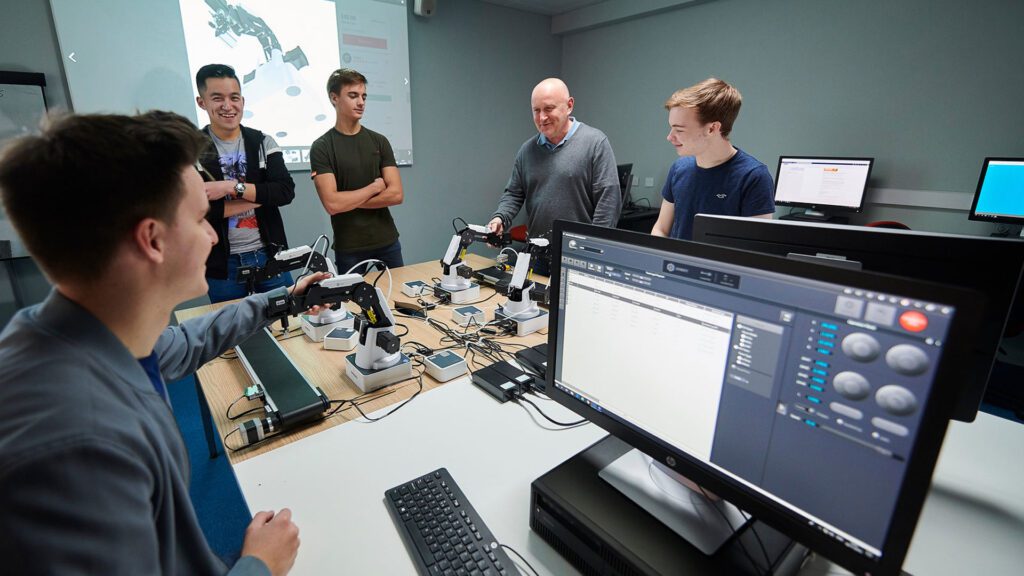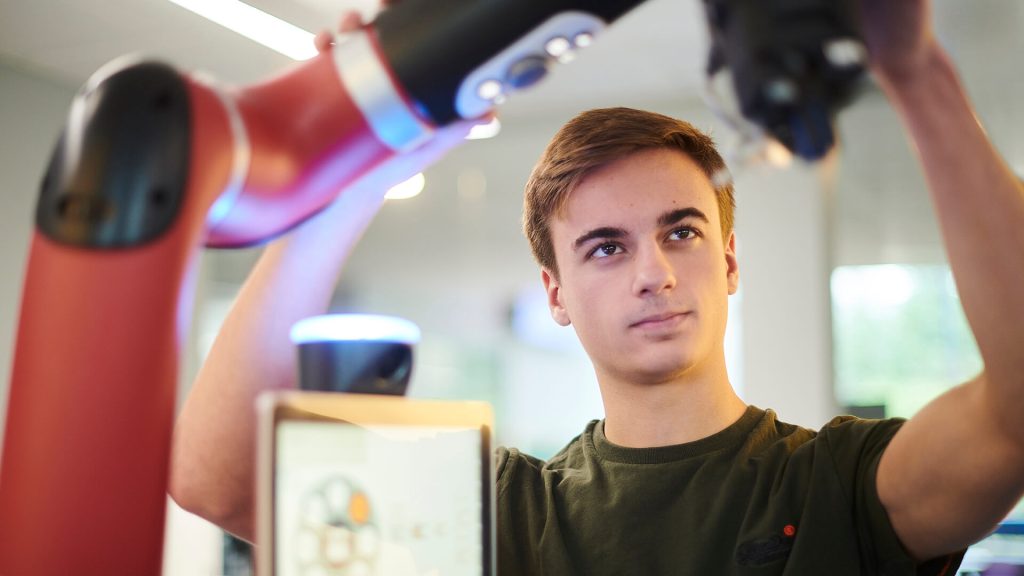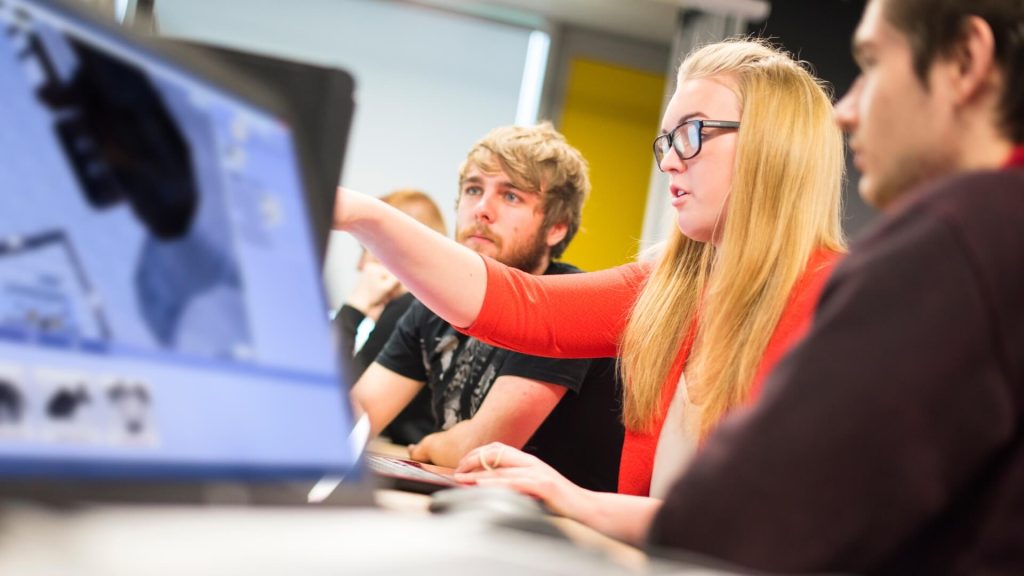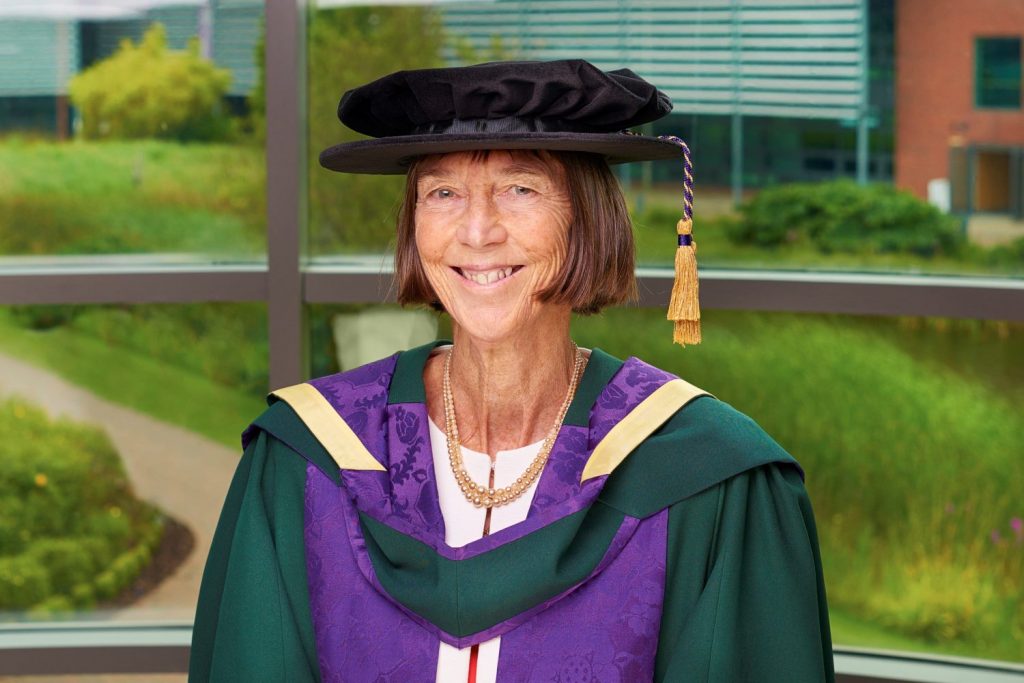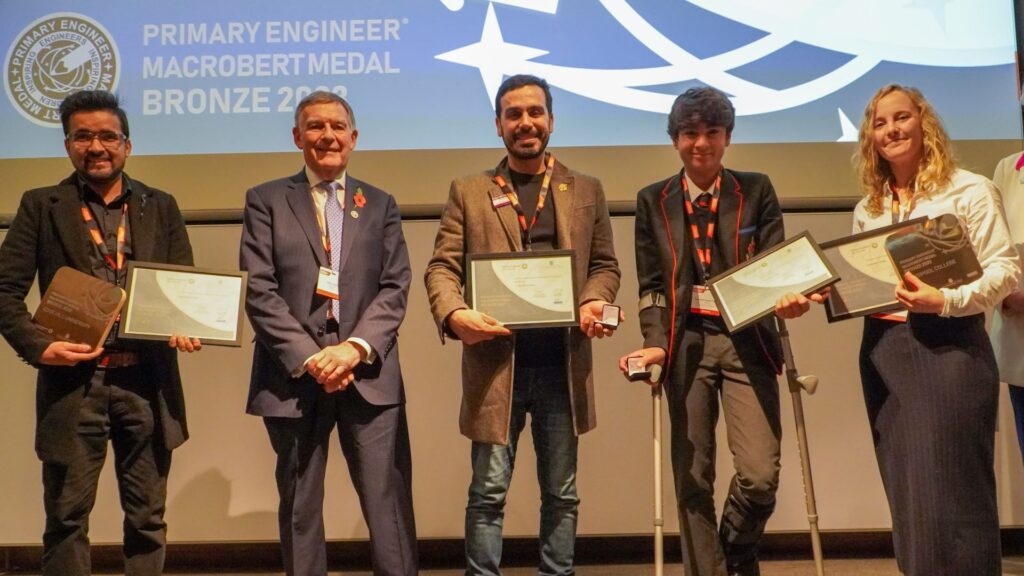Mechanical Engineering BEng (Hons)
UCAS code: H300
Your engineering career starts at Edge Hill University. Discover the core disciplines of mechanical engineering, programming and applied mathematics. Prepare for industry by immersing yourself in the technology underpinning a range of mechanical systems, theories and instrumentation techniques.
Overview
| Course length: | 3 years full-time |
|---|---|
| Start dates: | September 2024 September 2025 |
| Location: | Edge Hill University |
| Example offers: | BBC-BBB (A Level) or DMM (BTEC) View full entry criteria |
| Subject(s): | Engineering and Physics |
| Faculty: | Arts and Sciences |
| Department: | Engineering |
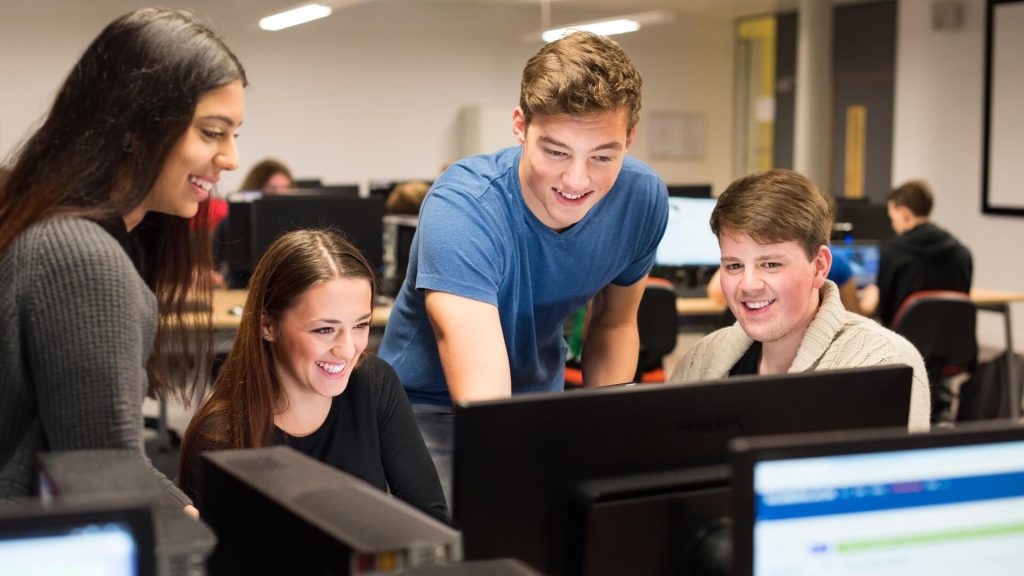
Working as a mechanical engineer is all about designing equipment, developing prototypes and evaluating tools. Think it might be the career for you? At Edge Hill, we’ll prepare you to solve real-world challenges facing fast-growing sectors like transport, defence and robotics.
We’ve designed a degree that will prepare you for different aspects of mechanical engineering. Think exciting areas like automated manufacture, computer-aided engineering and applied industrial engineering. There are plenty of possibilities in this field.
Thermodynamics and fluid mechanics, computing technologies and mechatronics are just a few of the areas you’ll explore. We’ll also spend time helping you become confident with the rapidly changing world of mechanical engineering.
You’ll graduate as a skilled professional with knowledge in everything from programming to control theory, modelling to professional practice. With skills sought after by organisations across sectors, you’ll be able to manage the design and development of mechanical engineering systems.
Course features
-
International students can apply
-
Sandwich year option available
-
Studying abroad option available
What you'll study
Your first year focuses on providing you with a solid foundation for the rest of the course. We’ll give you insight into a range of current topics, from analysis and the fundamentals of the design, to construction of systems and the foundations of engineering mathematics. These subjects focus on the key principles underpinning engineering materials, electrical and electronic engineering, computation and programming, and mathematical principles.
Year 2 provides you with a more specialised focus. Take a closer look at fluid mechanics, thermodynamics, structural and solid mechanics, and control systems and instrumentation. At the same time, explore the principles of mathematics for engineering. You’ll have the chance to work on live briefs, deliver real products and work as part of a team. Want even more practical experience? Before beginning Year 3, you can complete a 12-month industrial placement or year abroad.
Investigate topics covering mechatronics, and manufacture and design. Develop expertise in engineering management and enterprise. In Year 3, you’ll have plenty of opportunities to develop advanced knowledge and skills in more specialist fields. You’ll also carry out a research and development project in the form of software or hardware. Everything you do in Year 3 is designed to help you develop and will focus on independent study.
How you'll study
Teaching methods are designed in consultation with leading employers in the region. Many classes are based in engineering and computing laboratories, focusing on student activity as a means of learning. We introduce theoretical concepts by building on concrete practical activity.
Classes are highly interactive, with practical application of concepts a key factor, as well as cases drawn from real-life. Workshops, seminars, group tutorials and practical exercises provide opportunities for you to work with your peers and develop the essential people skills to complement your technical ability.
Studying on a full-time basis, you will be required to attend up to four days a week.
How you'll be assessed
You will be assessed through a combination of practical exercises, reports, essays, presentations and examinations. We want you to develop the ability to work effectively both independently and as part of a team, therefore assessment includes both of these forms, though the emphasis is strongly on individual work.
Who will be teaching you
You will be taught by staff who are passionate about student learning and development, while also benefitting from guest lectures delivered by industry experts. The programme team are specialists in engineering and computing and are active researchers. Their research feeds directly into the teaching of the programme, ensuring that you will learn about the latest developments within subjects while gaining the skills and knowledge required to meet industrial needs.
Academic staff are also regular contributors to conferences and journals, frequently engaging with the wider business and academic environment in disseminating knowledge and delivering impact.
Entry criteria
Entry requirements
Typical offer 112-120 UCAS Tariff points. This must include A Level Mathematics at Grade C or above or equivalent. GCSE English Language at Grade C or Grade 4 or above, or equivalent, is also required.
For students studying BTEC a BTEC Extended Diploma in Engineering is preferred. Typical offers will be DMM, with grade Merit or above in one of the following units:
- to solve engineering problems
- engineering mathematics
Example offers
| Qualification | Requirement |
|---|---|
| A Level | BBC-BBB. |
| BTEC Extended Diploma (or combination of BTEC QCF qualifications) | Distinction, Merit, Merit (DMM). |
| T Level | Overall grade of Merit. |
| International Baccalaureate (IB) | We are happy to accept IB qualifications which achieve the required number of UCAS Tariff points. |
| Access to Higher Education Diploma | 45 credits at Level 3, for example 15 credits at Distinction and 30 credits at Merit or 24 credits at Distinction and 21 credits at Merit. The required total can be attained from various credit combinations. |
Please note, the above examples may differ from actual offers made. A combination of A Level and BTEC awards may also be accepted.
If you have a minimum of two A Levels (or equivalent), there is no maximum number of qualifications that we will accept UCAS points from. This includes additional qualifications such as Extended Project Qualification (EPQ), AS Levels that haven't been continued to A Level, and General Studies AS or A Level awards.
English language requirements
International students require IELTS 6.0, with a score no lower than 5.5 in each individual component, or an equivalent English language qualification.
If your current level of English is half a band, one band, or one-and-a-half bands lower, either overall or in one or two elements, you may want to consider our Pre-Sessional English course.
How to apply
Apply full-time
Read our guide to applying through UCAS to find out more about the application process.
Apply part-time
Complete our online application form if you want to study this course on a part-time basis.
International
Please see our international student pages for further information about how to apply as a prospective international student.
Should you accept an offer of a place to study with us and formally enrol as a student, you will be subject to the provisions of the regulations, rules, codes, conditions and policies which apply to our students. These are available at www.edgehill.ac.uk/studentterms.
If you join a full time undergraduate degree at Edge Hill University, we will guarantee you the offer of a room in our halls of residence for the first year of your course.
Discover our accommodation
Facilities
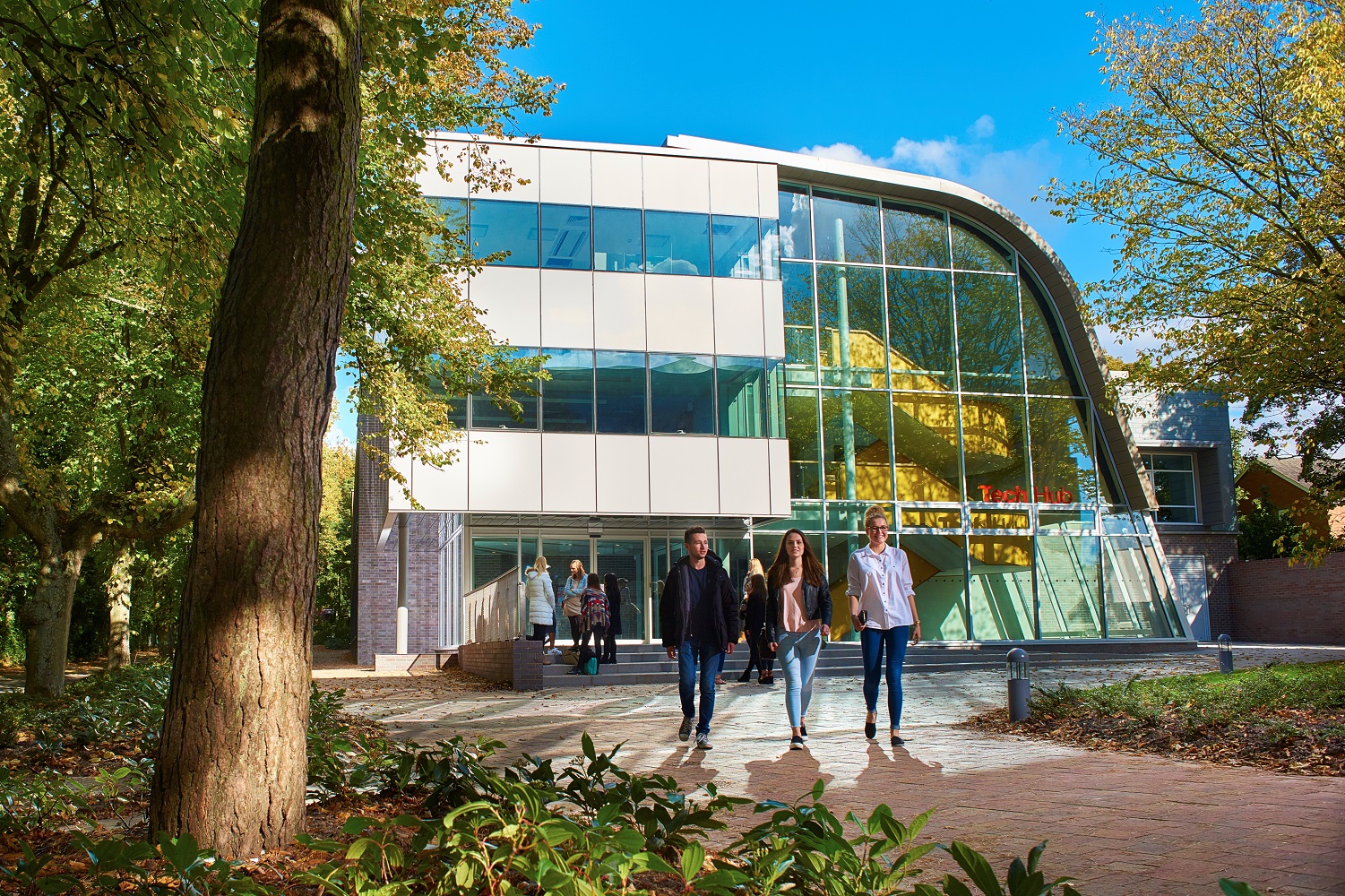
The Department of Engineering is based in the state-of-the-art £13m Tech Hub. This purpose-built development offers highly contemporary suites of outstanding facilities for Engineering and Physics, as well as Computing and IT students. Our modern engineering teaching laboratories are equipped with a range of industry-standard, test and measurement equipment, and leading analytical software.
There are dedicated specialist laboratories for materials engineering, electrical motors, and electronic engineering, in addition to an abundance of computer facilities and a large, horseshoe-shaped Harvard style lecture theatre.
Where you'll study
Tech Hub
Learning resources
Learning resources include oscilloscopes, signal generators, digital multimeters, Arduino and Raspberry Pi microprocessors, a tensile tester machine, electronics training kits, single and 3-phase transformers, a 3-D printer, and robotic arm kits, plus MATLAB and SolidWorks software platforms.
Teaching and learning are supported by the web-based platform Blackboard Ultra Virtual learning Environment. The library is well-stocked with recommended print books and e-books and subscribes to high-impact technical e-Journals. The university subscribes to LinkedIn Learning, which provides free and unlimited access to thousands of high-quality online courses and video tutorials written by industry experts.
Assistive and accessible technologies include Read&Write text to speech software, Caption Ed to facilitate ease of note taking, and a mind mapping tool. The university provides specific workshops on academic skills for students who have specific learning difficulty or disability.
Finance
Tuition fees
UK Full-Time
£9,250
a year
UK Part-Time
£77 per credit
for 360 credits
International
£16,500
a year
EU/EEA and Swiss students who have settled or pre-settled status under the EU Settlement Scheme, as well as Irish nationals, may be eligible for the UK tuition fee rate.
Financial support
Subject to eligibility, UK students joining this course can apply for a Tuition Fee Loan from the Government to cover the full cost of tuition fees. UK students enrolling on the course may also be eligible to apply for additional funding to help with living costs.
Please view the relevant Money Matters guide for comprehensive information about the financial support available to eligible UK students.
EU/EEA and Swiss students who have settled or pre-settled status under the EU Settlement Scheme may be eligible to apply for financial support. Irish nationals can ordinarily apply to Student Universal Support Ireland (SUSI). If you are an EU student who does not have settled or pre-settled status, or are an international student from a non-EU country, please see our international student finance pages.
Your future career
According to the latest data provided by HESA (Higher Education Statistics Agency), in 2018/19 high skilled graduates of Engineering and Technology could expect a starting salary of £28,000.
As a qualified engineer, you’ll have lots of choices when it comes to career paths. Many students decide to work in technological development with machinery. However, you could also apply your skills to accountancy, computer science, and teaching.
As a mechanical engineer, you could work in a variety of areas including:
- aerospace
- automotive
- manufacturing
- medical equipment
- renewable energy
- systems design
Or perhaps you’d prefer to continue studying? Postgraduate study is a great way to gain expertise in a specific field. Alternatively, a Masters degree in a business-related subject can boost your commercial awareness and business acumen.
Mechanical engineering is a fast-paced discipline so continuous professional development is key for maintaining your knowledge. As a graduate, you might attend conferences or complete short courses run by professional bodies, such as the Institute of Mechanical Engineering (IMechE). You might also join in-house training, take part in workshops or study part-time at university alongside your role.
Course changes
Every effort has been made to ensure the accuracy of this information, however our courses are subject to ongoing review and development. Changing circumstances may necessitate alteration to, or the cancellation of, courses.
Changes may be necessary to comply with the requirements of professional bodies, revisions to subject benchmarks statements, to keep courses updated and contemporary, or as a result of student feedback. We reserve the right to make variations if we consider such action to be necessary or in the best interests of students.
